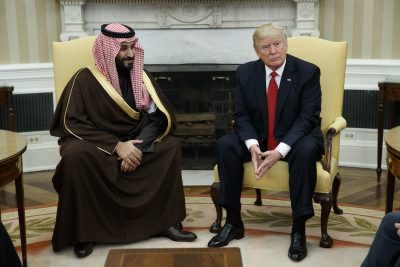Can Washington Prevent the Death of the Gulf States?

U.S. Secretary of State Tillerson is angry that Saudi Arabia and the UAE rejected his efforts to calm down their spat with Qatar. His revenge, and a threat of more serious measures, comes in the form of a WaPo “leak” – UAE orchestrated hacking of Qatari government sites, sparking regional upheaval, according to U.S. intelligence officials:
The United Arab Emirates orchestrated the hacking of Qatari government news and social media sites in order to post incendiary false quotes attributed to Qatar’s emir, Sheikh Tamim Bin Hamad al-Thani, in late May that sparked the ongoing upheaval between Qatar and its neighbors, according to U.S. intelligence officials.Officials became aware last week that newly analyzed information gathered by U.S. intelligence agencies confirmed that on May 23, senior members of the UAE government discussed the plan and its implementation. The officials said it remains unclear whether the UAE carried out the hacks itself or contracted to have them done.
That the UAE and/or the Saudis were involved in the hack was pretty clear from the get go. They were the only ones who had a clear motive. Qatar already had specific evidence for the source of the hacking. Congressional anti-Russian sources ignored that and accused, as usual, Russia and Putin.
Tillerson’s real message is not the hacking accusation. The hacks themselves are not relevant to the spat and to Tillerson’s efforts to defuse it. The “leak” sets the UAE and Saudi leadership on notice that the U.S. has sources and methods to learn of their government’s innermost discussions. The real threat to them is that other dirt could be released from the same source.
It is doubtful that this threat will change the minds of these rulers. They believe in their own invincibility. Ian Welsh describes the mindset in his prediction of The Death of Saudi Arabia and other Gulf states:
This is fairly standard: all dynasties go bad eventually because the kings-to-be grow up in wealth and power and think it’s the natural state of things: that they are brilliant and deserve it all, when it was handed them on a platter. Perhaps they are good at palace intrigue and think that extends beyond the palace.It doesn’t.
Welsh comes to the same conclusion as I did when the recent GCC infighting broke out:
No matter how the spat with Qatar ends, the GCC unity has (again) been exposed as a sham. It can not be repaired. Saudi “leadership” is shown to be just brutal bullying and will be resisted. U.S. plans for a united GCC under Saudi leadership and U.S. control are in shambles.
…
The Saudi under their new leadership overestimate their capabilities. So did Trump when he raised their role. The Saudi “apes with Macbooks” do not have the capabilities needed for a serious political actor in this world. Their money can paper over that for only so long.
The step Tillerson and some “intelligence officials” now took may be a sign panic. The “leak” revealed “sources and methods”. Like every other government the UAE senior officials suspect that the U.S. is trying to listen to their internal deliberations. But they now know for sure. The specific date given in the “leak” will help them to take some countermeasures. Leaking “sources and methods” is not done lightly. That it has to resort to such measures shows that the U.S. administration is not in control of the situation.
During the fall of the Ottoman empire Britain created today’s Saudi Arabia. Two world wars exhausted Britain’s power. The U.S. took over the management of the empire including the Gulf states. It needs Saudi Arabia for its fossil energy and the related reserve currency status of the U.S. dollar. Unrest in Saudi Arabia is not in the U.S. interest but such is now in sight. The “leak” is just a tactical measure of an inexperienced administration. It is not enough to defuse or mitigate the conflict and its consequences.
What strategies will Washington develop to counter the foreseeable instability in Saudi Arabia and other Gulf states?

